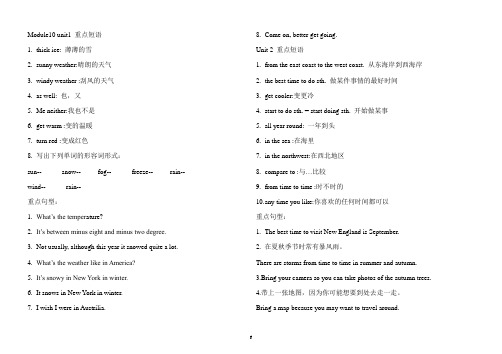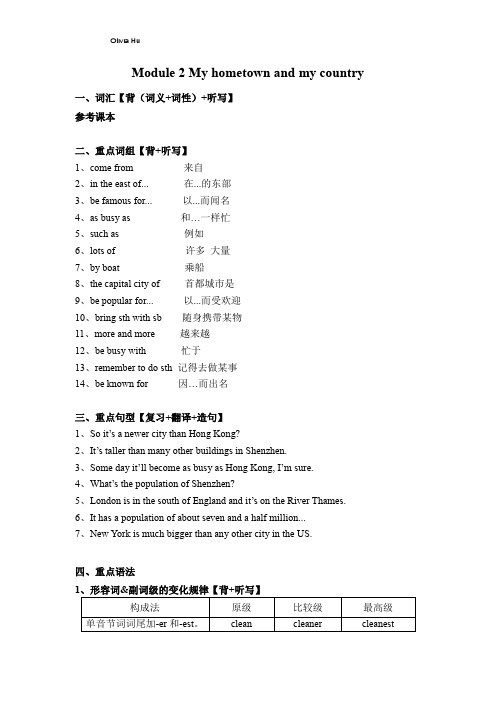外研社八年级英语_Module_2_Experiences_知识点外研社(新标准)
外研社八年级下册英语各模块知识点

每个模块都包含了不同的主题和词汇、语法、句型等相关知识点。
下面将对每个模块的重要知识点进行详细介绍:Unit 1 Making a difference:1.重点词汇:global warming, climate change, pollution, environment, volunteering, raise money, charity, benefit, organization, awareness等。
2.重点语法:情态动词should、must用法,情态动词和动词原形构成的短语动词。
3.重点句型:You should recycle paper, plastic and glass. We must take action to protect the environment. We can raise money for charity. I think volunteering can make a difference.Unit 2 I think that mooncakes are delicious!:1.重点词汇:pastries, traditional, festival, mooncake, dumpling, ingredients, filling等。
2.重点语法:情态动词can、could的用法,情态动词和动词原形构成的短语动词。
3.重点句型:You can use chopsticks to eat it. You could also try dumplings. I think that mooncakes are delicious.Unit 3 History:1.重点词汇:history, ancient, century, modern, ruler, explore, expedition, empire, civilization等。
2.重点语法:过去进行时,过去完成时。
八年级下册外研版英语知识点

八年级下册外研版英语知识点
以下是八年级下册外研版英语的部分知识点:
1. 动词不定式:在英语中,动词不定式是一种形式,它表示动作或状态,但不定式通常出现在句子的谓语动词之前。
例如,“to go to the movies”表示“去看电影”。
2. 情态动词:情态动词是英语中表示可能性、必要性和意愿的动词,如“can”、“should”、“must”等。
3. 介词:介词用于表示名词或代词与句子其他部分之间的关系,如“in”、“on”、“at”等。
4. 连词:连词用于连接两个或多个句子或从句,以表示它们之间的关系,如“and”、“but”、“or”等。
5. 代词:代词用于代替名词或名词短语,以避免重复,例如“she”、“he”、“it”等。
6. 副词:副词用于描述动词、形容词或其他副词的程度、方式或时间,例如“happily”、“very”、“usually”等。
7. 冠词:冠词用于限定名词,表明其类别或范围,例如“a”、“an”、“the”。
8. 时态:时态是表示动作发生的时间和方式的语法形式,例如“现在进行时”、“过去完成时”、“将来时”等。
9. 被动语态:被动语态是表示动作的承受者而不是执行者的语法形式,例如“The book is written by him.”。
10. 宾语从句:宾语从句是一个完整的句子作为另一个句子的宾语,通常由连词引导,例如“I know that he is a teacher.”。
希望以上内容对您有帮助。
建议查阅课本和练习册获取更多详细和具体的内容。
完整版)外研社八年级英语上册Module2知识点总结归纳

完整版)外研社八年级英语上册Module2知识点总结归纳XXXIn this article。
we will discuss some common mistakes related to the n and the use of the word "wide." We will also look at the correct way to use the word "n."XXXThe word "n" XXX to the people living in a XXX as "large" or "small," use "large," "big," or "small" instead of "much" or "little." For example。
India has a large n。
while Singapore has a small n.To indicate the number of people living in a particular area。
use the sentence structure "The n of + a place + is (was) + a number." Remember to use the definite article "the" before "n" when it is the subject of the sentence。
When the subject is theplace。
use the singular form of the verb。
For example。
新版外研社八年级英语上册短语重点句子整理M10-M12

Module10 unit1 重点短语1.thick ice: 薄薄的雪2.sunny weather:晴朗的天气3.windy weather :刮风的天气4.as well: 也,又5.Me neither:我也不是6.get warm :变的温暖7.turn red :变成红色8.写出下列单词的形容词形式:sun-- snow-- fog-- freeze-- rain-- wind-- rain--重点句型:1.What’s the temper ature?2.It’s between minus eight and minus two degree.3.Not usually, although this year it snowed quite a lot.4.What’s the weather like in America?5.It’s snowy in New York in winter.6.It snows in New York in winter.7.I wish I were in Austrilia. e on, better get going.Unit 2 重点短语1.from the east coast to the west coast. 从东海岸到西海岸2.the best time to do sth. 做某件事情的最好时间3.get cooler:变更冷4.start to do sth. = start doing sth. 开始做某事5.all year round: 一年到头6.in the sea :在海里7.in the northwest:在西北地区pare to :与…比较9.from time to time :时不时的10.a ny time you like:你喜欢的任何时间都可以重点句型:1.The best time to visit New England is September.2. 在夏秋季节时常有暴风雨。
外研社新标准英语八年级下课文原文及翻译 Module 2

外研社新标准英语八年级下课文原文及翻译Module 2Module 2 Unit 1 Can you tell me where you're from?Chen Huan: Do you know if Sally Maxwell has arrived?Receptionist: That's Miss Maxwell.Chen Huan: Hi, are you Sally?Sally: Yes, that's right. This is my friend Lingling, I asked you secretary whether she could come or not.Chen Huan: Oh, yes. Hi Lingling. OK, I'm going to ask you some personal questions, and record your answers. OK, here goes… Sally, welcome to China!Sally: Thank you.Chen Huan: Can you tell me where you are from?Sally: Yes, I'm from London. I'm here with some classmates. In fact, I'm studying Chinese.Chen Huan: And I've heard that you play in your school orchestra.Sally: Yes, our last public concert will be here on Starsearch in a couple of months. But I don't know who will come.Chen Huan: Can I ask you if you miss the UK, or your relations?Sally: Yes, I miss my parents, but I have some close friends here.Chen Huan: I know that foreigners find China very different from their own countries. What does it feel like?Sally: It's a very exciting place. But I don't like the word "foreigner". My visit here is all about making friends.Chen Huan: OK, Sally, thank you. And good luck with the concert… (They stop.)That was great! So this recording will be part of the programme. By the way, why don't you bring all your friends for a visit to Radio Beijing? Maybe sometimes next week?Lingling & Sally: OK, thanks!Module 2 Unit 2 No one knew who I wasWhen I was 13 years old, a boy gave me an important gift. It was a smile.It was the early autumn of my first year at a junior high school, and my old school was far away. As a result, no one knew who I was. I was very lonely, and afraid to make friends with anyone.Every time I heard the other students talking and laughing, I felt my heart break. I couldn't talk to anyone about my problem, and I didn't want my parents to worry about me.Then one day, my classmates talked happily with their friends, but I sat at my desk unhappily as usual. At that moment, a boy entered the classroom. I didn't know who he was. He passed me and then turned back. He looked at me and, without a word, smiled.Suddenly, I felt the touch of something bright and friendly. It made me feel happy, lively and warm.That smile changed my life. I started to talk with the other students and made friends. Day by day, I became closer to everyone in my class. The boy with the lucky smile has become my best friend now.One day, I asked him why he smiled, but he couldn't remember smiling at me!It doesn't matter because all the dark days have gone. Now I believe that the world is what you think it is, if you think you are lonely, you might always be alone. So smile at the world and it will smile back.第2模块陈欢:你知道萨莉马克斯威尔是否已经到了吗?接待员:那就是马克斯威尔女士。
外研社英语八上M2知识点归纳

Unit1基础知识归纳1.high(形容词)意为高的,多用来形容山、墙或飞机的飞机的飞行高度等,其名词为height,意为高度。
辨析:high与tall(1)指人、动物、树木等,主要用tall,不用high。
a tall woman a tall horse(2)指一个不与地面接触的人或物的高时,要用high,不用tall,比如站在桌子上,天空在天空上飞。
The plane is so high in the sky。
(3)指建筑物或山高时,tall和high都可以,不过high的程度比tall高(4)High可作副词,tall不能(5)tall的反义词为short,high的反义词是lowlion为数词,意为百万(1)million前有具体数字,表达具体的数目时,million用单数形式。
即:数词+million+名词复数。
five million dollars五百万美元(2)表达非具体数目时,用million,billion等的复数+of。
如:millions of people数百万人。
拓展:hundred(百),thousand(千),billion(十亿)的用法与million相同.3.So it’s a newer city than Hong Kong?所以它是一个比香港还新的城市吗?than译为:比。
是比较级的标志词,它前面的形容词、副词要用比较级。
4.In fact,it only became important in the 1980s.事实上,它只有在20世纪80年代才变得很重要。
in the 1980s表示20世纪80年代。
in the early 1980s在20世纪80年代早期,in the late 1980s 在20世纪80年代晚期5.What's the population of Shenzhen?深圳的人口是多少?(1)population是集合名词,没有复数形式。
外研社八年级英语上册Module2 词汇+知识点

Module 2 My hometown and my country 一、词汇【背(词义+词性)+听写】参考课本二、重点词组【背+听写】1、come from 来自2、in the east of... 在...的东部3、be famous for... 以...而闻名4、as busy as 和…一样忙5、such as 例如6、lots of 许多大量7、by boat 乘船8、the capital city of 首都城市是9、be popular for... 以...而受欢迎10、bring sth with sb 随身携带某物11、more and more 越来越12、be busy with 忙于13、remember to do sth 记得去做某事14、be known for 因…而出名三、重点句型【复习+翻译+造句】1、So it’s a newer city than Hong Kong?2、It’s taller than many other buildings in Shenzhen.3、Some day it’ll become as busy as Hong Kong, I’m sure.4、What’s the population of Shenzhen?5、London is in the south of England and it’s on the River Thames.6、It has a population of about seven and a half million...7、New York is much bigger than any other city in the US.四、重点语法*(1)有一些双音节可以加-er, -est,也可以加more, most e.g. common, funny, handsome, pleasant, quiet, stupid(2)在以下情况下,形容词加more, most, 而不加-er, -est(3)由“形容词+ly”构成的副词,加more, most 构成比较级和最高级。
(完整版)外研社八年级英语上册Module2知识点总结归纳

M2My home town and my countryUnit 11. population “(某一地区的)人口;全体居民”,它是一个集体名词。
有特殊用法,容易出错。
①形容人口的“多”或“少”,要用“large、big”或“small”,不用much或littleIndia has a large population. Singapore has a small population.②表示“某地有多少人口”的句型:The population of +某地+is(was)+数字,该句型中的population前要用定冠词the,作主语时,谓语动词常用第三人称单数形式。
(be动词用is;实义动词加s或es)某地+has a population of +数字The population of China is more than 1.3 billion.中国有大于十三亿人口= China has a population of more than 1.3 billion.③询问某国某地有多少人口时,要用How large...?或What...?How large is the population of ......?= What is the population of ......?How large is the population of Hong Kong?=What’s the population of Hong Kong?is the population of that country? About 17 million.A. How manyB. HowC. WhatD. How much④当主语是表示“人口的百分之几、几分之几”时,谓语动词用复数形式。
About seventy percent of the population in China are farmers.2.wide 宽的Wide adj 宽的;宽阔的;广泛的,做表语或者定语Widely adv 宽阔地;广泛地lion 百万①数字+million ,表示确切数目,million要用单数,后不加s,而且不接介词ofThere are about two milion people in the city.②millions + of ,数百万,表示不确切的数目,million要用复数,后加s,而且后接介词ofMillions of people all over the world come to visit the town.③后面的名词有了the, these, those等特指限定词修饰时,或其后的接的是us, them 这样的人称代词时,则此时必须用介词of。
- 1、下载文档前请自行甄别文档内容的完整性,平台不提供额外的编辑、内容补充、找答案等附加服务。
- 2、"仅部分预览"的文档,不可在线预览部分如存在完整性等问题,可反馈申请退款(可完整预览的文档不适用该条件!)。
- 3、如文档侵犯您的权益,请联系客服反馈,我们会尽快为您处理(人工客服工作时间:9:00-18:30)。
Module 2 Experiences(一)重点单词[单词学习]1. experience n. 经验(不可数),经历(可数)【例句】She has little experience because she has worked for only one month.He had many interesting experiences while travelling in Africa.[考题链接]Mr. Guo is a teacher of much teaching__________(经验).【用法】用作动词,表示“体验”“经历”等。
【例句】He experienced a great adventure.2. kind n. 种类;adj. 仁慈的,和善的【用法】all kinds of 各种各样的【例句】There are all kinds of animals in the zoo.It’s kind of you to invite me to your party.注意:This kind of books is very good.这类书都很不错。
(把这类书看作一个整体)3. problem n. 问题,难题【考查点】辨析:problem 与questionproblem指说话者认为难以解决的问题,它与动词solve或settle(解决)搭配。
而question指说话者需要寻找答案的问题,它常与动词ask或answer连用。
【例句】The problem is difficult to solve.May I ask you some questions?[考题链接]They have some ________ about getting there.A. questionsB. problemsC. questionD. problem答案:B解题思路:要完成以上题目,必须了解question和problem的区别,从而选择正确答案。
该句的意思是他们到达那儿有一定的难度。
question多指要求回答的问题,而problem是指较难或有待解决的问题。
4. ever adv. 永远,曾经,究竟【用法】主要用于否定句、疑问句等,常位于助动词或情态动词之后,行为动词之前,意思是“曾经”“以前”,有时往往有较灵活的译法。
【例句】Have you ever been abroad?[考题链接]—Have you ______ read the poem?—Yes, I really enjoy it.A. stillB. everC. yetD. never答案:B解题思路:考查副词,问句为现在完成时,可以和完成时连用的副词有ever, yet, never,结合句意可知答案为B。
5. before prep. 以前;在……之前【考查点】辨析:before与agoago 是副词,“……以前”。
它指从此刻起若干时间以前,常与过去时连用。
【例句】His parents died ten years ago.before 也可以用作副词,表示“……以前”,常与完成时连用。
也可放在时间点之前。
【例句】I have never been there before.Please come here before six o’clock.[考题链接]①I remember seeing you somewhere 2 years______.②I have read the novel______.答案:①ago ②before解题思路:①ago常与过去时连用②before常与完成时连用6. another (三个或三个以上当中的)另一个【例句】This coat is too big. Please show me another.【考查点】辨析:another, the other作代词的用法the other“两个数量中的另一个”,表示特指,总数为俩;another“总数为三个以上中任意的另一个”,表示泛指。
【例句】His parents both work in a hospital.One is a doctor and the other is a nurse.[即学即练]1. We have many ______ to solve.A. questionB. problemC. questionsD. problems2. Can you arrive at the school gate __________ 7:00 o’clock?A. agoB. beforeC. inD. on3. We saw _________________(各种各样的)animals in the zoo.答案:D B all kinds of解题思路:1. 本题考查problem与question的区别。
problem指说话者认为难以解决的问题,它与动词solve或settle(解决)搭配。
2. 在时间点之前通常用before。
(二)重点短语[短语学习]1. the price of ……的价格【例句】What’s the price of the book?2. take off 起飞;脱下(反义词:land着落put on 穿上)【例句】The plane will take off at 7:00 am and land at 10:00 am.3. come true 成为现实【例句】I hope my dream will come true.4. more than=over 超过5. sell out 卖光6. at the end 结束时【用法】at the end 与in the end 同义。
at the end of 在……结尾【例句】At the end, we found the boy.You can see the cinema at the end of the street.7. all over China 全中国all over the world 全世界[即学即练]根据汉语完成句子1. 三明治多少钱?______ _________ _______ ________ the sandwich?2. 我们学校有两千多名学生。
There are ________ ________ 2000 students in our school.3. 在聚会结束时,他唱了一首歌。
He sang a song _______ _______ _________ ________ ______ ________.答案:1. What’s the price of 2. more than 3. at the end of the party(三)重点句型[句子学习]1. Have you ever entered a competition? 你曾经参加过竞赛吗?【用法】enter 进入,参加2. And Sally has invited me to stay with her in England one day.Sally邀请我某天去英国跟她住在一起。
【用法】invite常用短语:invite sb. to do sth. 邀请某人做某事invite sb. to+地点邀请某人去某地【例句】He invited some friends to have dinner.I invite her to my house next Sunday.3. Han Li has been to San Francisco in the USA. 韩力曾经去过美国的旧金山。
【用法】have / has been to 去过……【例句】I haven’t been to the USA yet.【考查点】辨析:have / has been to 与have / has gone to[考题链接]—Where is Mrs. Smith?—She isn’t here. She ______ to England.A. has goneB. has beenC. wentD. goes答案:A解题思路:由句意可知,她不在这里,说明已去某地,故选A。
※※以上三个句子都用到了现在完成时。
1)含义:现在完成时表示过去发生的动作一直持续到现在,还可表示过去发生的动作对现在的影响。
2)基本结构:肯定:主语+have / has+动词过去分词+其他否定:主语+have / has+not+动词过去分词+其他一般疑问句:Have / Has+主语+动词过去分词+其他肯定回答:Yes, 主语+have / has.否定回答:No, 主语+haven’t / hasn’t.【例句】She has visited China before.She hasn’t visited China before.—Has she visited China before?—Yes, she has. / No, she hasn’t.[考题链接]—How clean the bedroom is!—Yes, I am sure that someone ____ it.A. cleansB. cleanedC. has cleanedD. had cleaned答案:C解题思路:由“How clean the bedroom is!”可知卧室已有人打扫过,并且现在还很干净,故用现在完成时。
4. It sounds brilliant! 那听起来好极了!【用法】sound为系动词,意为“听起来”,后面接形容词。
类似用法的词还有:look(看起来),smell(闻起来),taste(尝起来),feel(摸起来)。
[考题链接]—Hi, Tony. The milk shake(奶昔)______ good!—I’m glad you like it.A. soundsB. fallsC. goesD. tastes答案:D解析:根据句意“奶昔尝起来味道很好”可知应用“tastes(尝起来)”。
5. What do you reckon? =What do you think? 你是怎么认为的?6. The first prize is the holiday of your dreams in England.头等奖是你梦想的到英国度假。
【用法】dream n. 梦,梦想(“做梦”动词用have或dream 如:have a nice dream,dream a good dream)v. 做梦,梦想dream about 梦见dream of sth. 梦想(做)某事【例句】I had/dreamed a bad dream.When you go to sleep, what do you dream about?The boy dreams of becoming a pilot.[即学即练]1. I like Guilin. I ___ there twice.A. goB. wentC. have goneD. have been2. —Where’s Li Lei? — He ___ Beijing.A. goes toB. went toC. has gone toD. has been to3. —______ you _______ a ticket for the football match?—Not yet.A. Is, boughtB. Are, boughtC. Has, boughtD. Have, bought4. The music sounds ____.A. wonderfully enoughB. enough wonderfulC. enough wonderfullyD. wonderful enough5. 王林梦想某一天能到国外去。
